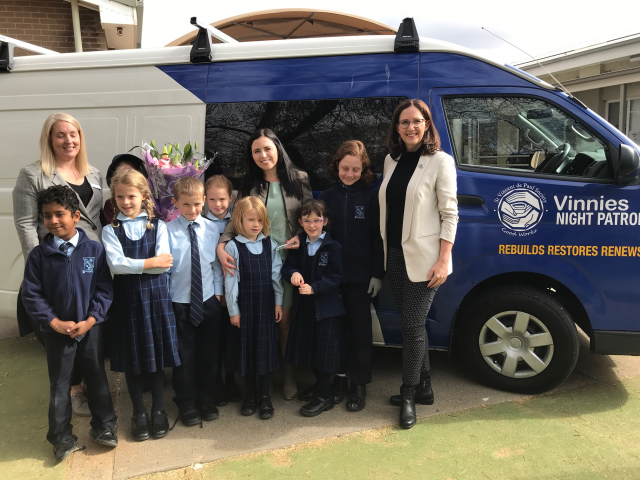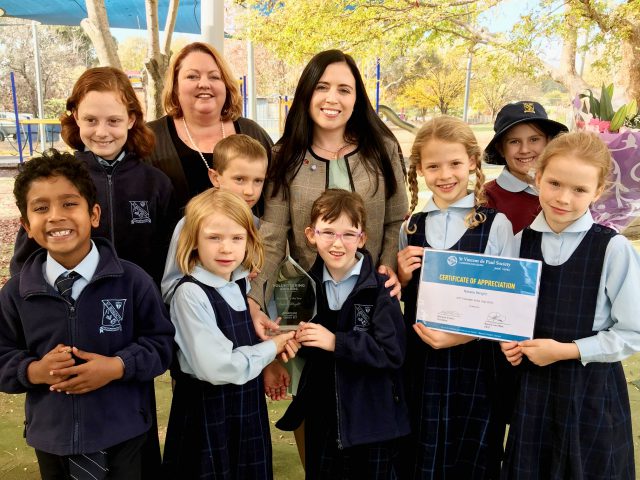Latest News
“To me it is just a part of my life.”
“I was so humbled and blessed to be surrounded by so many amazing people in that room, all doing work with vulnerable marginalised people.”
ACT Volunteer of the Year 2018 Natalie (Nat) Wright reflected on the awards evening that recognised her as a profound influence, inspiring hundreds of Canberra kids to be social justice advocates and to take action through volunteering to enact social change.
She was a self-proclaimed apprentice Religious Education coordinator at her previous school Good Shepherd (Amaroo) where she transformed a 25-strong mini Vinnies in toe 125 members, the country’s largest, ahead of implementing a whole-of-school model including students from Kinder to Year 6. Her efforts have had a ripple effect on Mini Vinnies programs throughout Catholic Schools in the Archdiocese of Canberra Goulburn. Nat says as young as Kinder children can be involved in social justice and humanitarian work and learning about human dignity and how to care for vulnerable people.
Nat is also a Night Patrol Team Leader with St Vincent De Paul Society Night Patrol having served on more than 300 night shifts over 12 years.

Nat shares her story …
“I first signed up for Night Patrol in my second year of my undergraduate degree at ACU. I can honestly say that back then I wasn’t entirely sure of what I was signing up for but after listening to a brief presentation from a volunteer I felt a desire to give it go. As a child, I experienced many volunteer opportunities, my mum was a nurse and I often helped her with outings for the sick and elderly. Also, many of my mum’s colleagues were struggling financially in single parent or low-income households and so we would often go their houses with food, clothes and toys for their children. In fact, giving other children my belongings and seeing the joy it brought them is some of my most distinct childhood memories. Although I had to laugh when my mum years later asked if I remembered going to visit these families and often been asked to literally hand over the doll or teddy in my arms that another child was shyly eyeing off, I said I do, why? My poor mum thought perhaps it was a little mean to expect such a thing of a 7-year-old, and admitted to feeling a bit guilty for doing this. I have since assured her that these visits and outings were the first of my volunteer experiences and I am so grateful for them because they were so genuine and authentic to the cause.
After signing up for Night Patrol at ACU and completing some training in communication skills and Occupational Health and Safety, I was assigned to the first Tuesday of the month team, who proudly call themselves the ‘Tuesday Terrors.’ A few years later I decided I wanted to have-a-go at being a Team Leader. My role as a Night Patrol volunteer is to be present in the moment, to be friendly and approachable, to offer practical assistance, and a sympathetic ear. My role as a Night Patrol Leader is to do these things as well as to build a positive and supportive team atmosphere, guide the team in the set-up and pack-up of resources, to be aware of the conversations each team member is engaged in, to be prepared to make the call to leave if any member feels unsafe, and to encourage a healthy debrief of the evening at the end of the shift.
A typical night out in the Night Patrol of course involves firstly preparing the van for the evening with supplies, but that is about as much predictability as you can expect. One aspect of the van is to offer refreshments, clothing, toiletries and guidance in locating other support services, however what most people really approach the van for is conversation, and you never really know what conversations you are going to be invited to participate in, some are light-hearted chatting about the weather, sport, movies, music, news etc… others though are deeply personal stories involving heart ache, suffering and survival, with no censorship or filtering. It is in these conversations that you learn so much about what it means to be human, to honestly reflect on our inherent human dignity and the impact you have just by simply acknowledging another’s story. I have been deeply moved by many of these conversations. Inevitably after a Night Patrol shift you ‘take stock’ of your own life on your drive home – you think about your family, your home, your job, and the opportunities that you are presented with to help you reach your full potential. I am so grateful.
For me personally, being a Night Patrol volunteer is part of my vocation as an educator and how I continue to nourish my faith. A large part of how I understand my faith is that we are all made in God’s image. How we come to know God is through our relationships, as it is through our interactions with others that we discover ourselves. It may seem difficult at first to have a conversation with a stranger, but I don’t believe that you get any closer to knowing your true self by having lots of comfortable interactions. At the end of the day we are just all walking each other home, and we must make the most of the journey.
My main motivation to continue volunteering in the Night Patrol program is my desire to be a part of social justice reform. Over the years I have tried to use different aspects of my life to be a ‘soundboard’ for this change; through my professional life as an educator, through my postgraduate studies in Moral Theology, through the life of both my school and local parishes, and within my personal life amongst my friends and family. I am extremely blessed that in all these parts of my life there are people who support me in pursuing my vocation. I was taught by my mother that to be compassionate is to offer more than just a token gesture, to act in compassion is to have a genuine experience of empathy. The person I see in front of me is someone’s son or daughter, maybe even someone’s brother or sister, or mother or father. What if this person was my mother or my brother?
What can be quite challenging as a Night Patrol Volunteer is that you need to be in a calm state of mind to participate in the evening, leaving any personal problems and worries behind to be fully present to your team and the people you serve. Sometimes this may mean that you need to make the call to not volunteer for the evening because you must self-preserve yourself both emotionally and spiritually. Seeing the raw emotion of a person whilst they tell their story of violence, loneliness, heartache, abandonment, suffering or survival can unsettle you and feel emotionally heavy. On these nights talking to your team members to debrief before you go home is so important, as is speaking to a loved one at home. Another challenge is on some occasions there can be violent behaviour due to amphetamine drugs or excessive drinking. It can become a bit frightening but we are well supported by the police and the Action Bus supervisors who always make a point of checking in with us each night.

Through my experience in the Night Patrol program I have observed how the issue of homelessness in Canberra has changed quite considerably over the years. When I first joined Night Patrol the people who visited the van were mostly middle-aged and elderly men. The choice of drugs of choice were depressants such as alcohol or heroin. And most of these people were in public housing, rarely were we approached by someone who was ‘sleeping rough.’ As time has past we have seen a significant increase in the amount of people accessing the van for support, both men and women of all ages. And of course, with poverty comes mental illness, and it is often obvious from our interactions with people that they are experiencing very poor mental health and are unable to take care of themselves properly. The choice of drug these days is amphetamines, which means that the people who are approaching the van are often highly agitated and irritable. Many people are sleeping rough or couch surfing due to the inadequate amount of public housing and crisis accommodation. Even young families now regularly approach the van for food, toiletries and clothes. Although homelessness in Canberra is on the rise, one positive initiative that has come about is the joining of many community out-reach services to be filtered from one place called ‘First Point,’ this means that those who are experiencing any level of homelessness can be guided to access the services relevant to them from the one location.
The Mini Vinnies Program is a school social justice program stemming from the St Vincent de Paul Society. The purpose of our Mini Vinnies program is to provide our students with authentic opportunities to grow as aspiring leaders in social justice reform. Although as a primary school we are obviously are restricted in some ways by the age of the students, however with a little creative thinking these obstacles can be overcome. Over six years our modest Mini Vinnies group of 25 students grew to 120 students, the largest Mini Vinnies group in Australia. This year we have trialled a new whole-school model to include all our students from kindergarten to year six allowing each year level to build a relationship with one of the specific services offered by the St Vincent de Paul Society. We are the first school to take this approach and it is proving to be quite successful. Some things that our Mini Vinnies students have done are;
- -Annual Door Knock Appeal
- -Winter Woollies Day: raising awareness, funds and winter woollies for the Night Patrol
- Weekly non-perishable food collection and Christmas hampers for the Holy Spirit Parish Vinnies conference
- Sleep-out: raises awareness and funds for the Street to Home program
- Cupcake stalls
- Attend external volunteering opportunities such as Christmas paper wrapping and Homelessness Connect Day
- Vinnies fashion parade show
- Growing food in our school garden for the Blue Door
- Making ‘Welcome to Canberra’ brochures for our migrants and refugees
- Packing toiletry kits for the Night Patrol Van
- Inviting volunteers to be guest speakers at the school
- Visiting nursing homes to sing songs
- Attending the Mini Vinnies student conference
Each student proudly calls themselves a ‘Mini Vinnie’ and are aspiring volunteers for the Society.
Students as young as five can express a basic understanding of what the issue of homelessness is and describe ways that they can help. These children are in training to be part of the change, telling their parents that when they grow up they are going to be a big Mini Vinnie. The message that these children are giving us is that your action needs to go beyond this evening. What you are doing tonight is making statement that homelessness in our community is not alright, but we need to also learn and understand from the people who are currently facing this problem and act, share their story and advocate for social change with the aim of long term improvement or else we are being stagnate in our ways. I encourage everyone to spend time to explore the many opportunities to volunteer with the Society to give back to our communities.”
